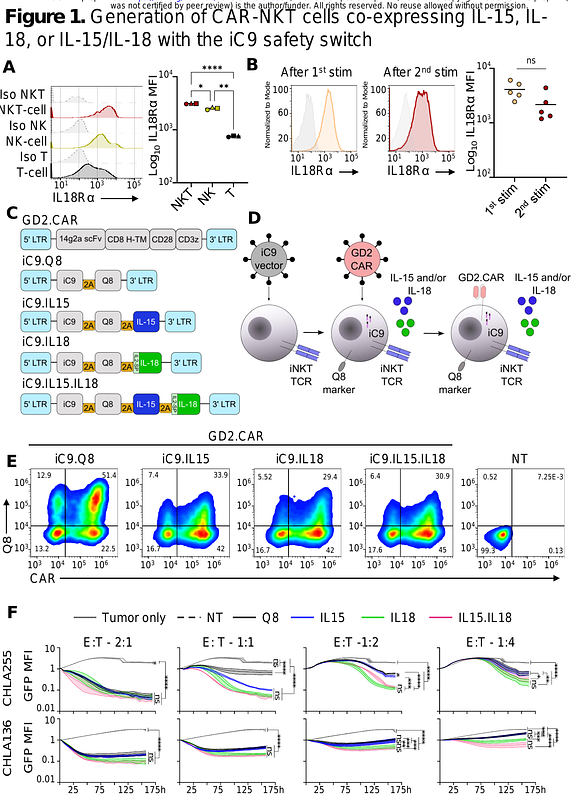IL-18 metabolically reprograms CAR-expressing natural killer T cells and enhances their antitumor activity against neuroblastoma

IL-18 metabolically reprograms CAR-expressing natural killer T cells and enhances their antitumor activity against neuroblastoma
Barragan, G. A.; de la Cerda, D. A.; Landoni, E.; Dholakia, K.; Humeniuk, P.; Caraballo, L. D.; Wang, Y.; Tian, G.; Yang, B.; Guo, L.; Wood, M.; Rios, X.; Xu, X.; Courtney, A. N.; Dotti, G.; Metelitsa, L. S.
AbstractInvariant natural killer T cells (NKTs) have intrinsic anti-tumor properties that make them promising candidates for chimeric antigen receptor (CAR)-based immunotherapies. Transgenic cytokine expression has been shown to enhance the potency of cellular immunotherapies, and we hypothesized that co-expressing IL-18 alone or with IL-15 would boost CAR-NKT therapeutic potential. To test this hypothesis, we generated retroviral constructs expressing IL-15 and/or IL-18 with the inducible caspase 9 (iC9) safety switch and co-transduced them with a GD2-specific CAR into human NKTs. Co-expression of IL-18 or IL-15/IL-18 increased GD2.CAR-NKT in vitro cytotoxicity, proliferation, and cytokine secretion compared to IL-15 alone. In a metastatic neuroblastoma model, GD2.CAR-NKTs expressing constructs with IL-18 controlled tumor growth better than cells expressing IL-15 only, but mice in the IL-15/IL-18 group developed severe toxicities not observed in the IL-18-only group. Mechanistically, we found that IL-18 drives a distinct transcriptional profile from IL-15 in CAR-NKTs marked by lower expression of exhaustion gene signatures and enrichment of metabolism-related processes. Finally, targeted metabolomics revealed that IL-18 induces broad metabolic reprogramming in CAR-NKTs including enhancement of oxidative phosphorylation, glycolysis, glutaminolysis and purine metabolism. These results support the use of IL-18 in developing the next generation of cytokine-armed CAR-NKT cancer immunotherapy.